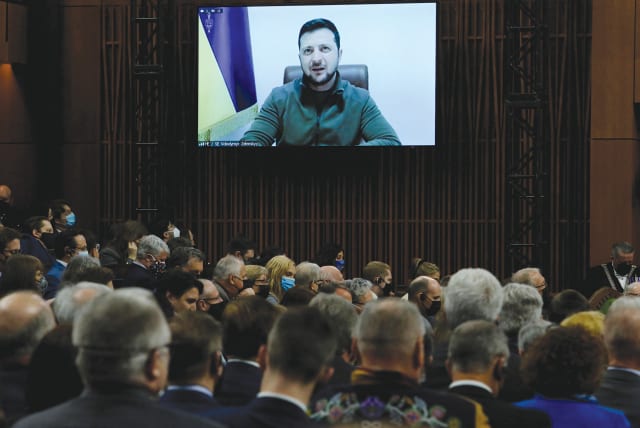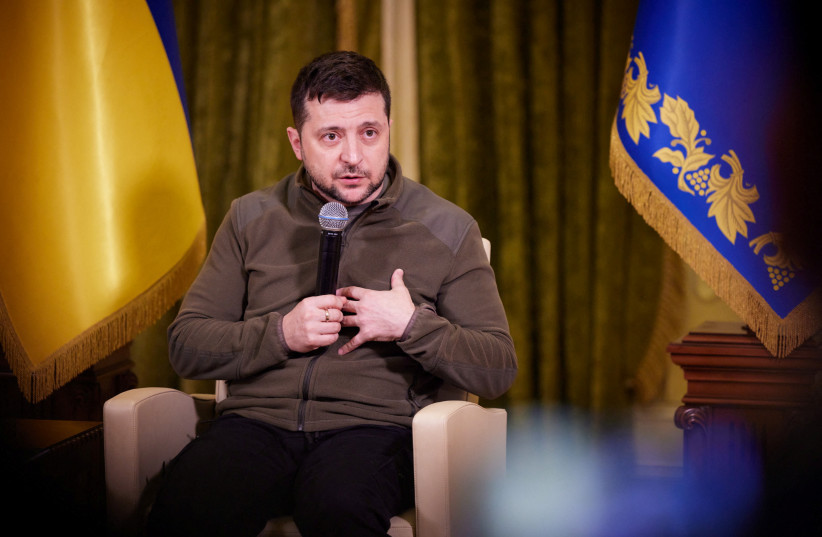Volodymyr Zelensky, the making of a modern Winston Churchill - opinion

No Hollywood producer could have made a war epic to top Zelensky’s selfie video from the heart of Kyiv. “We are here,” he said. “We are in Kyiv. We protect Ukraine.”
Ukraine’s first president of the Jewish faith was triumphantly elected in April 2019, winning more than 73% of the vote. Volodymyr Zelensky promised two things: The eradication of corruption and an end to the deadly skirmishes in eastern Ukraine.
Once Zelensky was an actor who satirized corruption and mismanagement in Ukraine by playing the Ukrainian president in the popular TV series Servant of the People. Next, he was the president, fighting the things he once satirized. Now, he is the Winston Churchill of his nation, summoning its animal instinct to survive with his words and his will.
His first two years proved challenging enough, fighting a pandemic and an epidemic of corruption as well as constant shoot-outs with militias – both backed by Russia. Still, he made some headway. He triggered a small agrarian revolution by authorizing the sale of state-owned farm land. He digitized many government services under the banner of “the country on your smartphone,” shrinking the scope for bribes by separating the bureaucrat for the citizen seeking permits and licenses. He was a genuine reformer.
But his plans are stopped there. Before the invasion, Ukraine remained one of the world’s leaders in bribes. It still ranks third among the most corrupt countries in Europe, behind Russia and Azerbaijan, according to the NGO Transparency International. The Russian-Ukrainian oligarchy is so powerful that Zelensky could do little.
And, as 2021 drew to a close, the promise of peace in the eastern Ukrainian region of Donbass rapidly receded. The Kremlin repeatedly rejected Zelensky’s proposals for peace.
If history had stopped there, Zelensky might have been known, if at all, as a reformer sadly overmatched by inside interests and outside enemies. Instead, the thunder of Russian artillery and the grumble of its tanks revealed a steel-backboned leader.
He refused to evacuate himself from Kiev and he adamantly refused to surrender. Then, on television and social media, he spoke. He spoke resolutely, defiantly, angrily, calmly, reassuringly and honestly.
He drew on all of his experience as an actor and presenter, displaying exceptional rhetorical talent. His words landed as powerfully as Russian bombs.
And, those words landed not just in Ukraine, but around the world. He became the symbol of Ukrainian resistance against the Russian invader. And many millions, who might not be sure where Ukraine is on a map, cheered and gathered to his side. The US Congress and the parliaments of Europe felt public opinion shift and hurried to get in front of it.
Just after the start of the Russian invasion, Zelensky set the rhetorical pace. On national television, he said he had a message for Russian forces: “If you attack, you will see our faces, not our backs!”
While Russian tanks and armored vehicles clogged Ukraine’s highway, Russian cruise missiles rained death and destruction on his capital of Kyiv, Zelensky knew his own life was in danger. Still, he radiated calm, absolute coolness, distinct courage and, above all, inspiring determination.
No Hollywood producer could have made a war epic to top Zelensky’s selfie video from the heart of Kyiv. “We are here,” he said. “We are in Kyiv. We protect Ukraine.”
“Our army is here. Our civil society is there. We are all here.”
Riveting words of simple power. He speaks to his nation not from a television studio, nor from a government office, but from the streets: Streets they know and recognize, streets for which he clearly says that he will shed his own blood.
Zelensky remained in Ukraine. As did his architect wife, his teenage daughter and nine-year-old son. With this decision, he reiterates the promise: “We are here.”
Vladimir Putin, through his megalomania, made a hero out of Zelensky and villain out of himself.
Wars are not movies, of course. The brave and the good do not automatically win in the end. Consider the brave premiers of Czechoslovakia in 1938 or Poland in 1939. Zelensky may still die for beliefs, alongside many thousands of his countrymen, but he has laid down a marker for the ages, a defiant voice for freedom that will sound down through the generations.
Through his brave words and braver actions, he set the stage for a triumphant outcome. He could still save his country and his young family. Certainly, the whole world is cheering for him.
The writer is a publisher of The Jerusalem Strategic Tribune. He is on the board of directors of many think tanks, including the Atlantic Council, International Crisis Group, Center for Strategic and International Studies, Foreign Policy Research Institute, and Center for the National Interest.
Jerusalem Post Store
`; document.getElementById("linkPremium").innerHTML = cont; var divWithLink = document.getElementById("premium-link"); if (divWithLink !== null && divWithLink !== 'undefined') { divWithLink.style.border = "solid 1px #cb0f3e"; divWithLink.style.textAlign = "center"; divWithLink.style.marginBottom = "15px"; divWithLink.style.marginTop = "15px"; divWithLink.style.width = "100%"; divWithLink.style.backgroundColor = "#122952"; divWithLink.style.color = "#ffffff"; divWithLink.style.lineHeight = "1.5"; } } (function (v, i) { });

